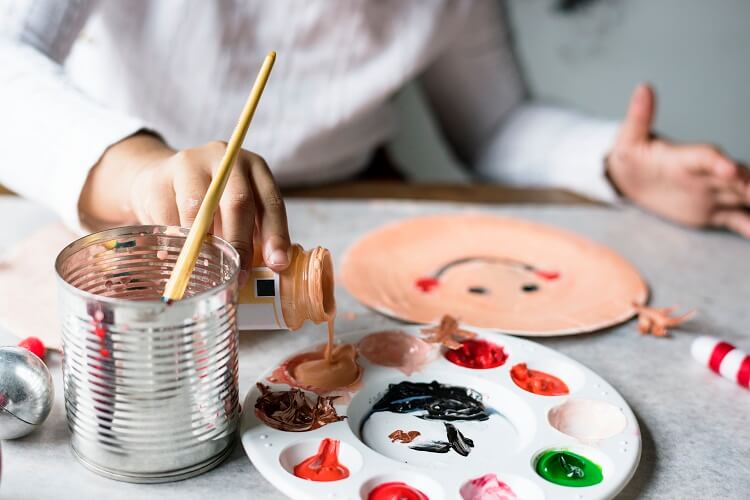Christmas Craft for Kids: Why Art and Craft are Important for Your Kids?


Christmas is a beautiful time of year for everybody, but nothing compares to the delight that children feel during the holidays. In fact, children might get so enthralled by the impending holiday that they become a little.
You have gifts to wrap, cakes to bake, and cards to write in the meanwhile. But don’t worry, we’ve got the ideal solution. With our list of Christmas activities for kids, you can keep those tiny elves engaged and make the holiday even more wonderful for them.
In this article, you will learn some fun and interesting ideas for Christmas crafts for kids.
Christmas Craft for Kids
It’s almost Christmas Time once more! Kids like making projects and decorating the Christmas trees. Here are some simple Christmas activities that kids will love.
Christmas Craft Ideas for Kids
Here are some amazing craft ideas for kids to try in this holiday season.
Make a Popcorn Garland
Sometimes all you need is for your tiny ones to sit and relax. And what better way to keep kids occupied than with a craft that serves as a diversion, décor, and food all in one? All you want is a fresh supply of popcorn, some creating thread, a pair of scissors, and a craft needle to make the perfect popcorn garland.
Re-enact Their Favourite Story
You could pass the day binge-watching films, but getting off the sofa and re-enacting your family’s favourite holiday movies is a lot more fun. Of course, we wouldn’t expect you to replicate the entire two-hour production of Miracle on 34th Street, but you can suit up and act in a few scenes.
Cupcake Christmas Trees
To build the Christmas trees, use Christmas-themed cupcake liners. Adorn the trees by placing them on cards or in a garland.
Make Paper Snowflakes
All you need is a piece of white printing paper, some fold and lopping, and you’ve got yourself some cute holiday decor. Best of all, any child who can manage a pair of scissors can complete this simple project.
Santa and Reindeer Puppets
Make this pair of Santa and reindeer dolls with your child and have them perform a puppet performance or wear them as faces as one of your favourite reindeer crafts.
Learning courses for your kids! Get a free trial here
Some More Christmas Craft Ideas
Christmas Paddle Pop Stick Characters
Pad pop sticks, wiggly eyes, and felt are used to make craft ornaments for your tree. Is there anything more you can think of for a character?
Owl Baubles
Have a good time crafting these adorable owls. Make your own baubles by starting with simple baubles and adding embellishments. Parents who like a well-coordinated tree or a sentimental ornament will enjoy it for years.
Reindeer Baubles
You may manufacture customised reindeer decorations using your child’s thumbprint to present to teachers, friends, and relatives.
Reindeer Hat
A reindeer hat is really lovely! Stick your child’s forearm print on a brown paper crown to make the antlers.
Pasta Wreath
To build this easy DIY wreath, add sparkle and colours to uncooked spaghetti. This design is perfect for Christmas cards and gift tags.
Also Read: Fun Activities for Kids: Explore More about Child Learning Activities to Brighten Your Kids
Cardboard Wreath
This cardboard wreath may be made with a paper plate and toilet paper wraps. Pin it from your front door to greet all of your holiday guests.
Recycled Card Ornaments
Create these DIY decorations for the tree using leftover cards from past years. Allow the children to embellish these ornaments with sequins, small pom-poms, and other objects from their creative box.
Salt Dough Ornaments
You can build these Santa and Reindeer salt dough decorations using your child’s hands and footprints. The best part is that you will see how much their hand or feet size has grown each year when you dig out the ornaments!
Handprints of Reindeer
You may make a variety of amusing objects with your hand or footprint, such as this reindeer. To make your child’s handprint more lifelike, add antlers and eyes. If you want to make this a truly unique present, have your children produce their artwork on these fantastic Cards For Kids, which are specifically intended for arts and crafts gifts.
Felt Christmas Tree Garland
Cutting out felt trees and pasting shapes on them will be a hit with the kids. All of the trees should be strung together and hung around your home. This colourful felt tree garland will provide a festive touch to any room.
Christmas Tree with Ribbons
This is a really basic activity that can be used to teach your child how to make knots. To construct this tree ornament, gather some branches and use red or green ribbons.
They can make a great present! If you’ve gone to the bother of making beautiful handcrafted gifts, you’ll adore these customised Card Packs, which add a personalized feel to your thoughtful presents.
Amazing Christmas Facts
Here is a list of Christmas facts that will amaze you as well as your kids.
# Christmas celebrates the birth of Jesus Christ.
# Christmas trees were first used by ancient Egyptians and Romans.
# The term ‘Xmas’ simply means Christmas.
# Santa Claus was known as Sinterklaas in Dutch.
# Santa Claus did not always dress up in red clothes.
# Rudolph, the ‘Red-Nosed Reindeer’ has helpers too!
# Baby Jesus received some wonderful gifts when he was born.
# The Christmas wreath is a symbol of love and eternal life.
# Carolling is based on the tradition of wassailing.
# Santa gets a lot of work done with the help of elves!
# The mistletoe is the symbol of love and laughter!
# Christmas stockings are cute, warm, and spacious!
# Wearing cute and stylish Christmas sweaters is now a competition!
# People give Christmas cards to convey their feelings to their loved ones.
# There’s a story behind the ’12 days of Christmas’.
Also Read: Social Studies Activities for Kids: Make Them Fall in Love With The Subject
Why are Art and Craft Important for Your Kids?
Motor skills
When children use creative materials with their fingers, they are honing their fine motor skills by using the little muscles in their hands. As babies learn to use both arms at the same time, their unilateral coordination improves.
When kids paint, colour, attach and cut, all of this happens. The faster their fine motor skills improve, the more they will be able to accomplish independently, from eating to fastening their own shoelaces.
Literacy
Art and crafts skills for young children span a wide range of topics, from speaking and reading to taking the time to understand. When children make art or crafts, they get the opportunity to talk about what they’ve made, which helps them enhance their communication skills. “Can you tell me how you came up with that colour?” “Explain your creation to me.”
They learn new words from their parents and utilise their listening abilities to follow verbal orders. All parents want their kids to acquire this ability as quickly as possible so that they can start listening to us!
Math Concepts
When it pertains to arts and crafts exercises, basic numeracy skills are sometimes forgotten. However, math skills are frequently used and have a positive effect on the performance of arithmetic skills in preschoolers.
Kids may learn to identify and identify different shapes, count and organise their art tools, and even gauge the lengths and sizes of various art materials. You’ll need solid thinking and problem-solving abilities to learn math, which arts & crafts activities can aid with.
Creativity
Art allows children to express themselves creatively, which is beneficial throughout their life. You enable self-expression when you do anything creative, and this allows youngsters to express (and cope with) their feelings. It also promotes brain growth in youngsters by allowing them to experiment with new concepts, thinking strategies, and problem-solving techniques.
Confidence in Oneself
Art and craft activities provide children a sense of accomplishment and allow them to feel pride in their creation, which increases their self-esteem. Making art is a good, safe way to learn that making mistakes is natural and that doing things ‘wrong’ may lead to completely new ideas.
Children get to experience new activities while refining their “self-regulation skills” at the same time. This helps children acquire patience, which is something that every youngster needs help with.
Quality time
Kids adore spending time with their parents, and what better way to spend quality time together than doing arts and crafts? You get to spend precious time with your children while also building memories that will last a lifetime.
You can talk about what you’re doing and explore other ideas and topics while you’re crafting together. You are free to express your thoughts, feelings, and concerns. Plus, your child isn’t interacting with technology or staring at a screen!
Conclusion
Every youngster goes through a developmental process. Learning and mastering abilities such as sitting, walking, speaking, skipping, and fastening shoes are all part of this process. Most youngsters master these skills, known as developmental milestones, over a certain period of time.
Milestones are achieved in consecutive order. This indicates that a child must first master some talents before moving on to master others. Kids, for instance, must first learn to crawl and then pull themselves up to a standing posture before they can walk. Each new milestone that a youngster achieves builds on the previous one.
Get the best out of your child by visiting The Real School Of Montessori now!
Also Read: Gandhi Jayanti Craft Ideas: Helping Kids to Learn Via Activities
Learning courses for your kids! Get free trial here
Recent Posts
What are the Advantages of Online Teaching at The Real School?
In the article -"What are the Advantages of Online Teaching at The Real School?" we…
What is the Full Form of School?: Unveiling the Acronym
The term "school" carries profound significance in the realm of education, representing more than just…
What is Math Full Form?: Cracking the Code
Mathematics, often referred to as "Math," is a subject that elicits various reactions from students…
What is Full Form of Homework?: Decoding Academics
Homework, an integral part of the academic journey, often raises questions about its purpose and…
What is Full Form of Teacher?: Demystifying Education
In the intricate tapestry of education, teachers stand as the pillars shaping the intellectual and…
What is Real Education?: Discovering Its Essence and Impact
The concept of real education is evolving, transcending traditional views that equate it solely with…


